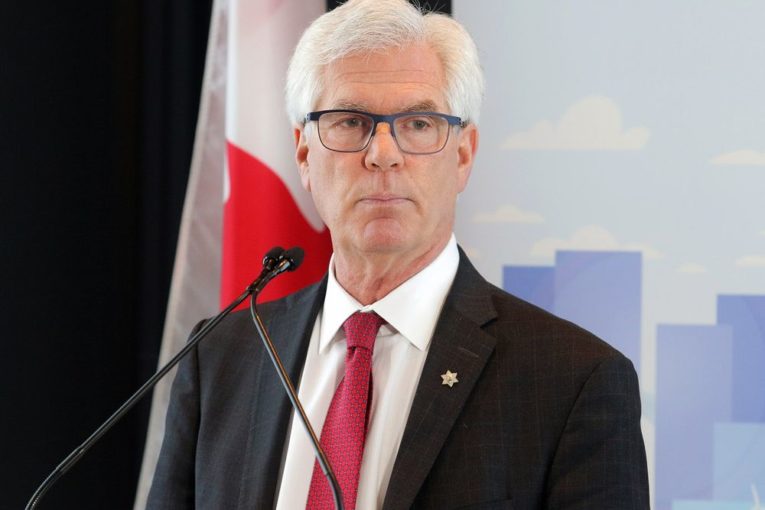
Step up.
It’s not just a Hollywood drama about dancing, it’s a clarion call from Kinder Morgan, business groups and the province of Alberta, pressing the Trudeau government to get involved in the B.C. pipeline fracas.
But if anyone thought Premier Rachel Notley’s request for Ottawa to “step up” and enter the conflict over the Trans Mountain pipeline would force the federal hand, think again.
In Calgary on Thursday, Natural Resources Minister Jim Carr reiterated his support for the project that would triple the amount of Alberta oil moving to the West Coast.
He also showed remarkable dexterity stickhandling around the delicate issue of how the federal government will specifically react in the ongoing dispute over B.C.’s proposal to limit bitumen shipments.
“The Government of British Columbia is free to consult. The Government of British Columbia cannot infringe on federal jurisdiction that impacts the national interest,” he said during a trip to Calgary.
“As this process plays through, (we) will be absolutely alert to any attempts to delay this project. We want this project built. We want it built expeditiously.”
His comments were soothing, but lacked specifics.
On the bright side, the federal tone has become more resolute since the fight began a week ago.
A trade war between the two western provinces erupted after B.C. Premier John Horgan’s government said it would consult with the public on proposed regulations to limit additional bitumen shipments moving through that province.
It will set up a scientific panel to study the effect of a potential spill and the ability to clean it up, a process that could take months or a year to wrap up.
However, interprovincial pipelines fall under federal jurisdiction.
B.C. hasn’t introduced regulations yet on what its planned restrictions would look like, which means there’s nothing to legally challenge.
The promise is a kind of phantom menace, meant to harass and potentially delay the $7.4-billion development without having to take actual form.
Project proponent Kinder Morgan, the oilpatch and Notley have all called on the Trudeau government in recent days to make its intentions known, although it’s unclear exactly what the federal government is willing to do to enforce its will.
“They are saying the right things, but they need to step in and ensure there’s clarity on getting that project done,” said Canadian Energy Pipeline Association CEO Chris Bloomer.
“The odd sound bite doesn’t really cut it.”
So what does?
The easy options appear limited at this stage.
“The Trudeau government is in a much more difficult place than people give them credit for,” said Kent Fellows, a research associate in energy and environmental policy at the University of Calgary.
“All Premier Horgan has done at this point is announce a plan to consult. There’s nothing there to slap down.”
For pipeline proponents, including the Alberta government, the broader concern is what this looming threat might do to investor confidence if it’s not forcefully rejected.
Companies need certainty that if they follow the rules, they can move ahead and make multibillion-dollar investments.
In the case of Kinder Morgan, the pipeline operator went through National Energy Board hearings, won approval and received federal backing.
But the threat of future delays — Trans Mountain is already a year behind schedule — hangs over the initiative.
Thankfully, the federal government has proclaimed the project is in the national interest and will be built. It’s sent senior officials to British Columbia to meet with the provincial government and try to lower the temperature.
Carr noted Ottawa intervened at the National Energy Board last year when the City of Burnaby delayed giving permits to the project and could do so again.
“The Government of Canada will respond when there is new action taken by the Government of British Columbia,” Carr said in an interview.
“The Government of Canada has all kinds of possibilities, but it’s not productive to speculate what they might be when we don’t know what we’re responding to.”
As law professor Eric Adams from the University of Alberta points out, the federal government has various political levers it can use to pressure any province.
It can push for negotiations and convene talks, or engage in some good old fashion political horse-trading to resolve an impasse.
If that doesn’t work, it has a big hammer to use if it wants assert federal authority.
Ottawa can pass laws or regulations to disallow provincial forays into an area of federal jurisdiction, such as pipeline oversight.
“It can override provincial laws under the doctrine of paramountcy, which says the federal government will take precedence where there is a conflict,” he said.
“There’s a real reluctance to use the second box and get out the hammer … you never want to use a hammer to open up a peanut.”
Expect to see the Notley government try to turn up the pressure in the coming days and force Ottawa into the fray, while B.C. will strive to downplay the dispute while keeping its own proposal intact.
For the energy industry, clarity can’t come soon enough.
You don’t have to look much further than comments from Suncor Energy CEO Steve Williams on Thursday to understand what’s at stake.
The head of the oilsands giant said regulatory issues and higher taxes are making Canada a more difficult place to invest in these days.
If industry players decide to back away from investing in the country’s energy sector, who will step into the breach?
When it comes to pipelines, the federal-provincial dance continues.
Chris Varcoe is a Calgary Herald columnist.
You can read more of the news on source
